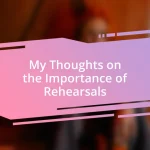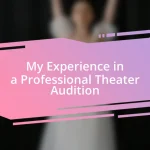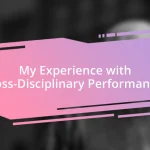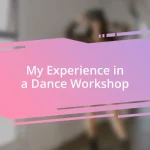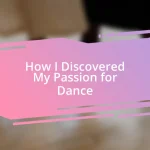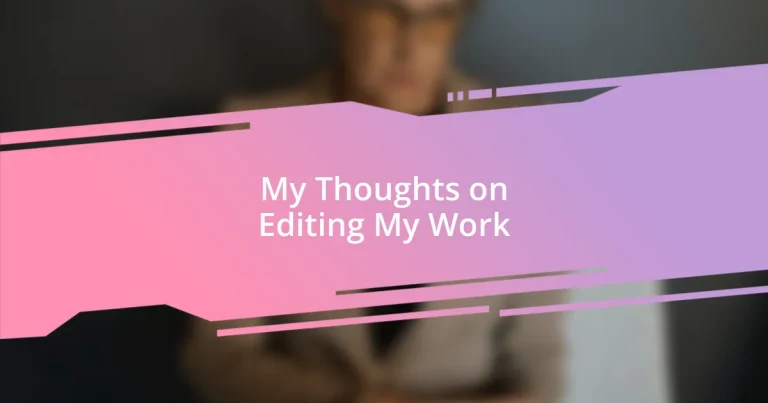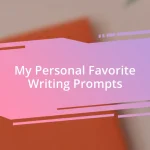Key takeaways:
- Editing is a crucial stage that transforms writing and reveals its essence; taking a break before editing helps identify inconsistencies.
- Self-editing strengthens clarity and confidence, while common mistakes include rushing revisions, clinging to favorite phrases, and over-focusing on grammar at the expense of content.
- Utilizing tools, seeking feedback, and finalizing with attention to detail enhance the editing process, ensuring the final work is polished and effectively communicates the intended message.
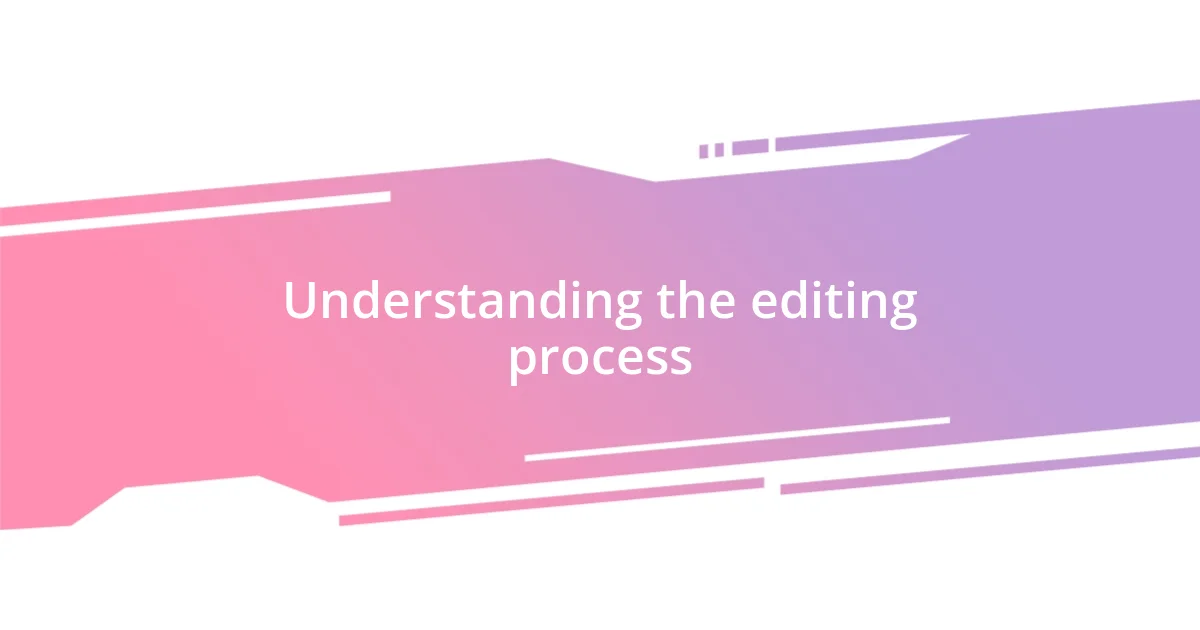
Understanding the editing process
Editing is often an overlooked stage in the writing process, but it’s where the magic truly happens. Reflecting on my own experiences, I’ve come to realize that this is the moment when I uncover the soul of my work. Have you ever felt that exhilarating thrill when a piece of writing transforms because of just a few revisions? It’s like watching a caterpillar emerge from its cocoon.
When I dive into the editing process, I often start with a fresh perspective. I find it helpful to take a break before revisiting my work. That distance allows me to see inconsistencies and areas needing clarity—things that I easily overlooked while in the throes of creation. Have you tried this approach? I’ve learned that stepping back can unveil blind spots I hadn’t even considered.
There’s also an emotional component to editing that I can’t ignore. It can sometimes feel like dissecting a part of myself, especially when I’ve poured my heart into my writing. However, I’ve found that embracing constructive criticism, whether from peers or just my inner voice, can be a remarkable growth opportunity. Which pieces of feedback have you found most enlightening in your own process?
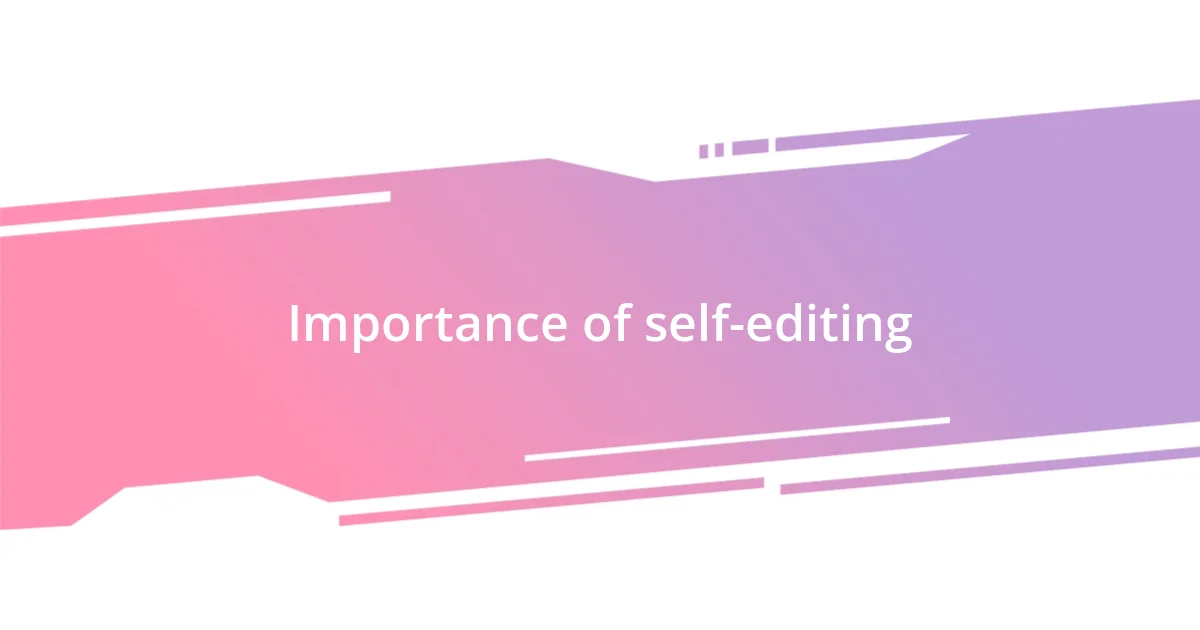
Importance of self-editing
Self-editing is crucial because it allows me to refine my ideas and ensure that my message resonates with the reader. I’ve often found that the initial draft is just a skeleton of what I really want to convey, and through self-editing, I can give it the life it deserves. For instance, after several rounds of editing on an article I was passionate about, I managed to eliminate unnecessary jargon, making it more accessible. The changes not only clarified my message but also enhanced my connection with the audience.
- It helps catch typos and grammatical errors that might distract readers.
- Self-editing strengthens the clarity and coherence of my arguments.
- It allows for a deeper exploration of my thoughts and the effective arrangement of ideas.
- I gain confidence in my work by taking the time to polish it up.
- Ultimately, self-editing paves the way for delivering my best possible writing, making the entire effort worthwhile.
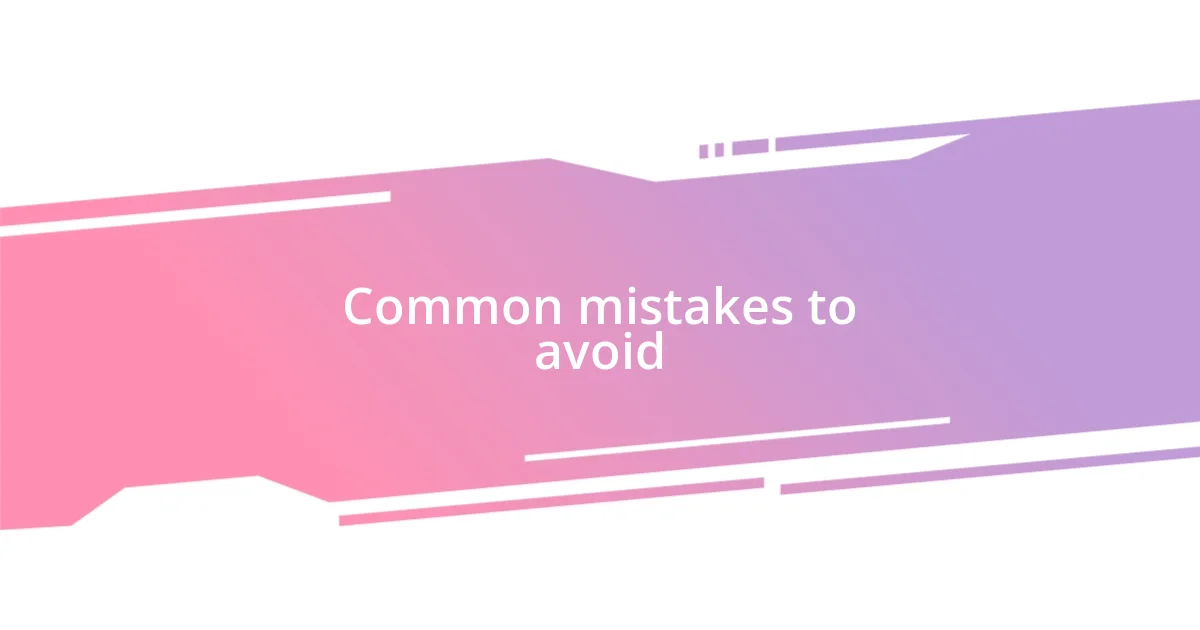
Common mistakes to avoid
Editing is a nuanced process, and I’ve learned that one of the most common mistakes is not allowing enough time for revisions. Rushing through this stage can lead to overlooking significant errors or missing the chance to enhance the overall quality of the work. I remember once submitting an article just days after writing it, only to find glaring typos and awkward sentences that could have easily been smoothed out with a little more time.
Another frequent pitfall is being overly attached to specific phrases or ideas. I’ve found that sometimes, what we love most in our writing can actually detract from clarity. When I first started writing, I clung to complex sentences, thinking they made me sound more sophisticated. However, the feedback I received taught me that simplicity often speaks louder. It’s an emotional challenge to let go of those beloved phrases, but it’s a necessary part of effective editing.
Lastly, a common mistake occurs when I focus too much on grammatical errors at the expense of content. While grammar is undoubtedly important, it can distract from evaluating the structure and flow of my ideas. There was a time when I polished my sentences meticulously only to realize that the overall message was muddled. I’ve learned that prioritizing the coherence of my thoughts should take precedence over minor grammatical tweaks in the initial rounds of editing.
| Mistake | Impact |
|---|---|
| Rushing the editing process | Leads to overlooked errors and missed enhancements |
| Clinging to favorite phrases | Muddles clarity and simplicity of expression |
| Focusing too much on grammar | Overrides engaging content structure and flow |
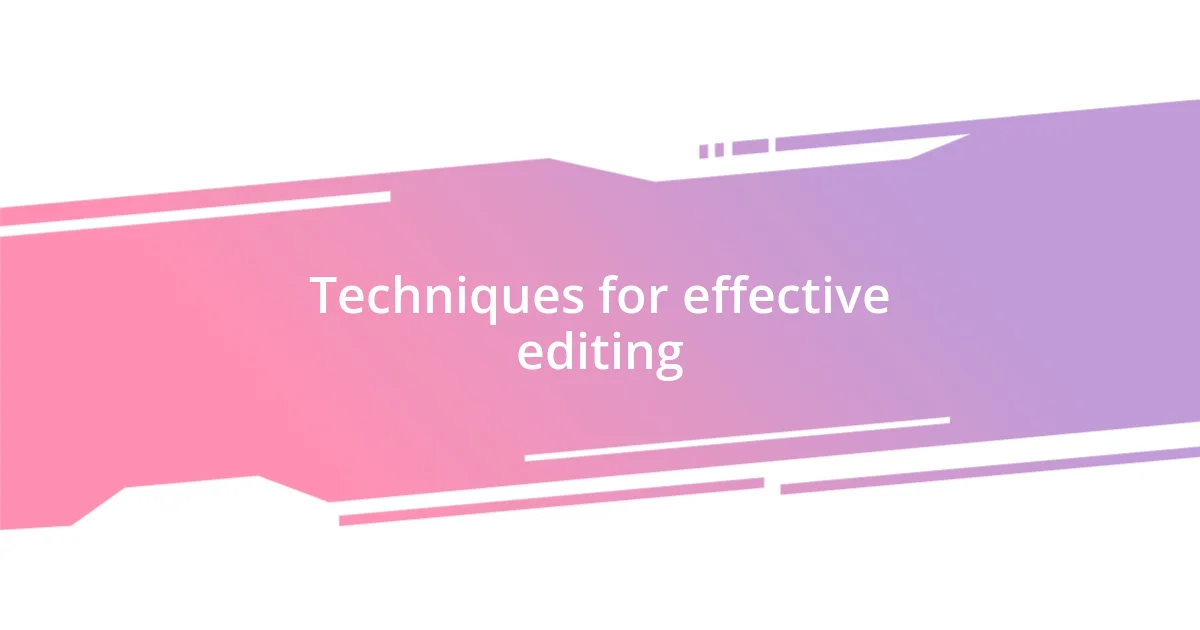
Techniques for effective editing
One of the most effective editing techniques I’ve embraced is stepping away from my work for a short period after finishing a draft. It may sound simple, but when I return with fresh eyes, I can spot inconsistencies or awkward phrases that I just couldn’t see before. It’s as if a fog lifts, allowing me to engage with my writing from a reader’s perspective. Don’t you think it’s fascinating how a little distance can create such clarity?
Another technique I incorporate is reading my work out loud. This practice helps me identify areas where my sentences might stumble or where the rhythm feels off. I often catch words that just don’t fit, and that can lead me to rethink whole sections. I recall an instance when I read a paragraph aloud and realized it sounded so convoluted that I chuckled—definitely not the reaction I intended! It’s a powerful reminder that what looks good on paper might not always translate to the ear.
Additionally, I find that using tools like checklists can help streamline my editing process. I’ve created personalized checklists that include everything from checking for grammatical errors to evaluating the overall flow of my argument. This method has not only saved me time but has also given me a sense of accomplishment as I tick off each item. It made me wonder—what small habits have the potential to revolutionize your own editing sessions?
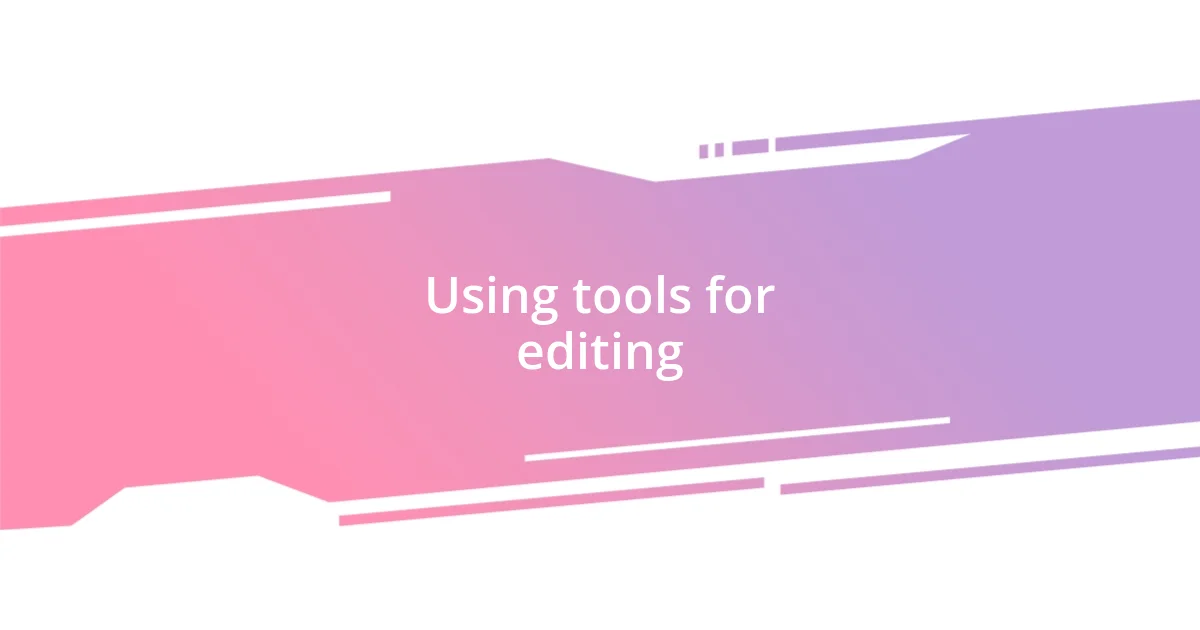
Using tools for editing
Using editing tools has been a game changer for me. I used to rely solely on my instincts, but integrating software like Grammarly and Hemingway Editor has really sharpened my final drafts. The first few times I used these tools, I was surprised at the number of overlooked errors they caught. Can you recall a moment when a simple tool transformed your approach to a task?
Beyond grammar and style, I also appreciate using word processors with built-in editing features. I often highlight sections that don’t flow well or need rephrasing as I go. Just the act of visually marking my work creates a sense of urgency and encourages me to revisit those pieces with fresh perspective. It’s like having a personal coach suggesting areas for improvement, guiding me toward clearer writing.
In my editing arsenal, I can’t forget about online forums and writing groups. Sharing my work with others and utilizing their insights has opened my eyes to aspects of my writing I never considered. I recall submitting a piece that I thought was polished, only to learn from feedback that my main argument was unclear. The experience taught me that collaborative tools and community critiques are invaluable in elevating the quality of my work. How has feedback from others shaped your writing journey?
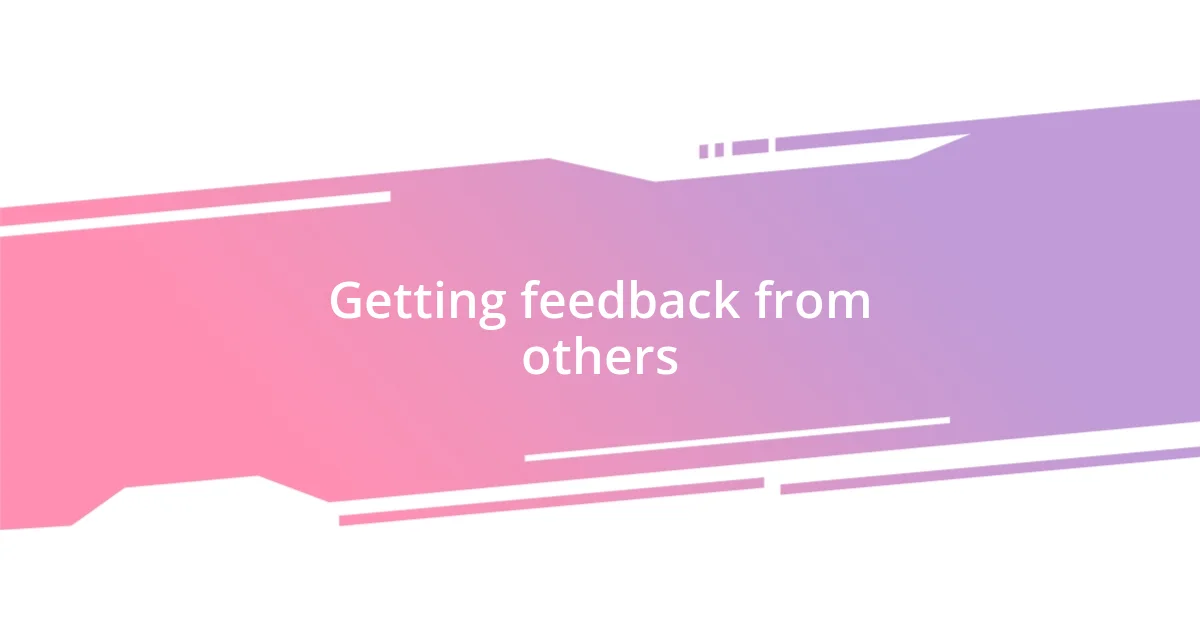
Getting feedback from others
Getting feedback from others has become an essential part of my editing process. I remember sharing a short story with a close friend who’s a fellow writer. Their honest critique opened my eyes to character inconsistencies I had overlooked. It was like peeling back the layers of my own work—uncomfortable at first, but ultimately liberating. Have you ever encountered a similar revelation through someone else’s perspective?
One thing I’ve learned is that feedback doesn’t just come from peers but can also originate from professional editors or writing groups. I once attended a workshop where we exchanged pieces for critique. The wide range of insights I received was extraordinary—it’s humbling how much others can see that we often miss. Since then, I actively seek out diverse viewpoints; the variety enriches my writing in unexpected ways. Have you ever thought about how different perspectives could enhance your own work?
However, not all feedback is created equal, and I’ve developed a knack for discerning what resonates with my vision. There have been times someone suggested changes that felt off-base or conflicting with the essence of my piece. Trusting my instincts while valuing insights has been a balancing act. It’s taught me that while feedback is invaluable, staying true to my voice is paramount. How do you find the balance between external comments and your internal vision?
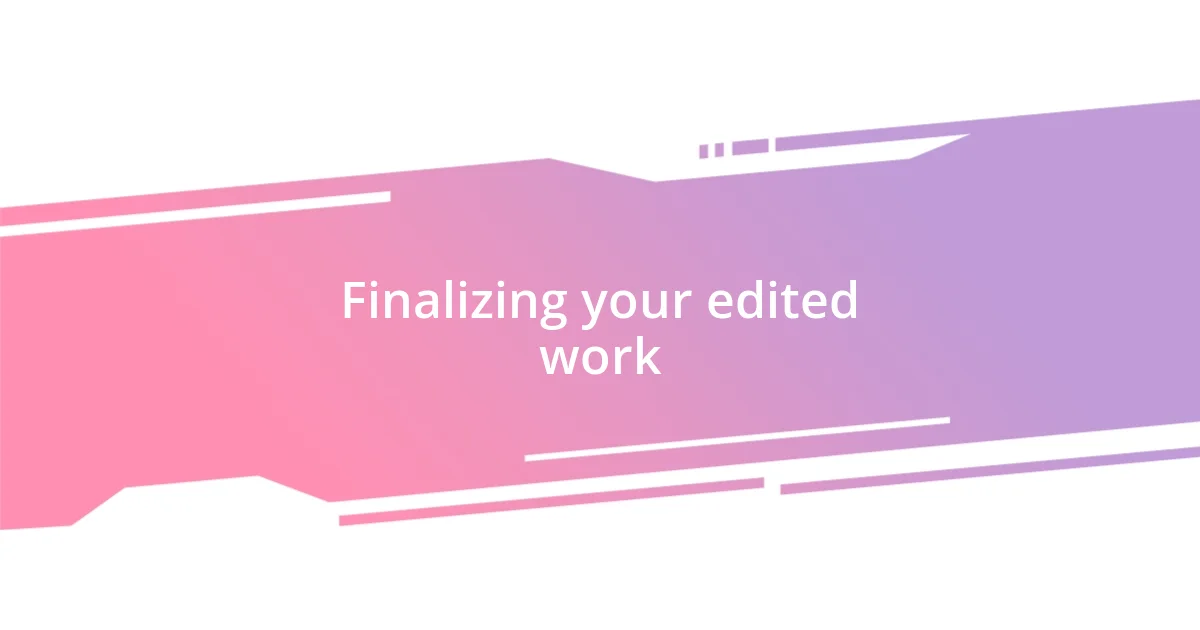
Finalizing your edited work
Finalizing your work can feel like both a relief and a challenge. After going through multiple rounds of edits, I often find myself in a state of heightened sensitivity to every word. I can remember the moment when I learned to step away from my piece for a brief time before the final review. It gave me clarity. When I returned, I was surprised at how fresh my perspective felt, allowing me to catch lingering inconsistencies I might have missed otherwise. Have you ever realized that distance can offer a clearer view?
One essential aspect I’ve taken to heart is reading my work aloud during the final stages. This practice brings the rhythm of my writing to the forefront, and I can hear awkward phrasing or unnecessary repetition more clearly. I vividly recall reading a poem I was initially proud of, only to realize it stumbled over its own cadence. That experience taught me that the way words sound can significantly affect their impact. Have you found that listening to your words changes your understanding of them?
As I finalize my edits, I also pay close attention to formatting and presentation. I once sent off an important piece without double-checking the layout, only to receive feedback pointing out its unprofessional appearance. It was a valuable lesson that presentation is just as important as content. This step isn’t just about polish; it’s about ensuring my voice stands out confidently. What strategies do you employ to make your final presentation reflect your message accurately?
